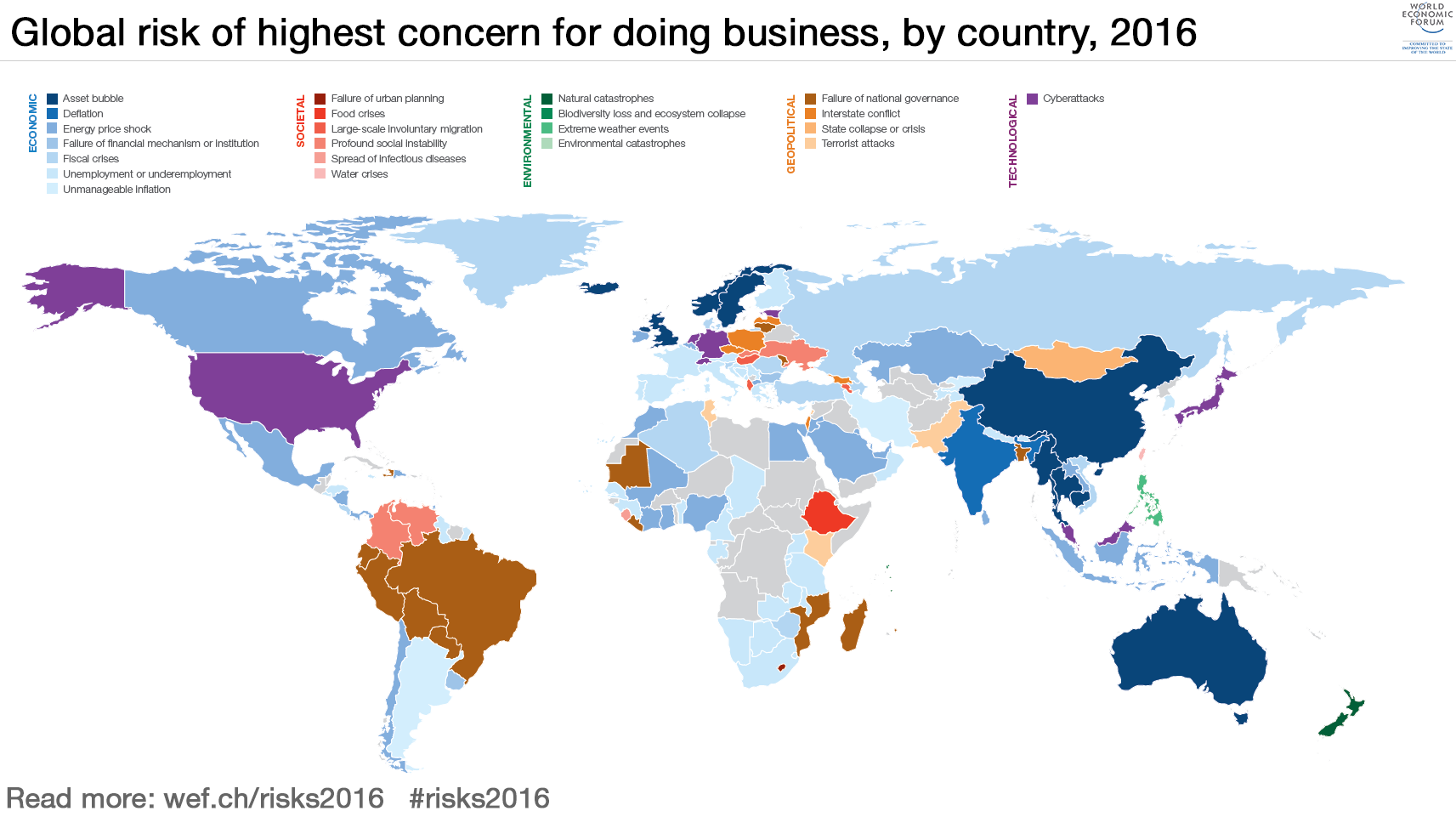Why climate change adaptation is key to managing global risks
Image: REUTERS/Aly Song
Stay up to date:
Global Risks
The consequences of climate change are causing growing concern among global leaders as they intersect with a large number of interconnected global risks.
The Global Risks Report 2016, published by the World Economic Forum in collaboration with Zurich Insurance Group and other leading institutions, found that while geopolitical risk such as uncontrolled immigration and interstate conflicts were seen as the most likely threat, climate issues were the risk factors most likely to influence other risks and thus had the greatest potential impact.
Failure of national governance was seen as the highest risk to doing business by executives in 14 countries, half of them in Latin America, four in sub-Saharan Africa, two in Eastern Europe and one in Asia.
Geopolitical risks
Those findings are hardly surprising, given that geopolitical tensions are now at their highest level since the end of the Cold War, with growing tension over maritime rights in the South China Sea, an ongoing conflict between Russia and Ukraine creating security concerns across the old soviet bloc and military intervention in Syria.
Elsewhere, there are heightened terrorism fears across Europe in the wake of the Paris attack in November 2015, continuing economic uncertainty across Europe after elections in Spain and the collapse of Portugal’s government, and concerns over global growth following a slowdown in the BRICS economies.
These tensions create numerous challenges for businesses and society. Companies face cancelled projects, interruptions to production and supply chains, restrictions on various activities and, potentially, politically motivated attacks on their employees and facilities. Heightened nationalism also increases the risk of protectionist measures and asset seizures.
Geopolitical tensions also divert resources and energy from addressing other issues of mutual concern, including climate change, while politicizing debates around key issues such as market regulation, cyber-crime and mutual security.
Climate change
Climate change remains one of the most pressing contributing factors to geopolitical and other risks, but mitigation efforts have largely failed.
In 2015, the global concentration of carbon dioxide – a key driver of climate change – exceeded 400 parts per million for the first time in recorded history, while global temperatures appear to have risen by 1 degree Celsius from the pre-Industrial era. The changes are already posing grave challenges for businesses and humanity, including an increase in coastal flooding, falling agricultural production, declining biodiversity, eco-system collapse (accompanied by declines in fish stocks, etc.), and higher costs for cooling and irrigation.
Those risks also have geopolitical consequences. Many people link the Arab spring uprising in 2011 to rising wheat prices, which resulted in protests in the streets of Libya, while potential disputes over water rights could lead to conflict.
Globally, withdrawals of fresh water have increased threefold over the last 50 years and demand is anticipated to rise by a further 40% by 2030.
Collaboration and cooperation
Given the scale and ever increasing complexity and interconnectivity of the challenges posed by climate change, political and other risk factors, it is perhaps understandable that many stakeholders choose to focus instead on the issues that they can manage. In a 2011 survey by the Wharton Business School, for example, more than half of respondents said that the simplest way to manage geopolitical risks was to avoid investing in volatile markets.
Interconnectivity, however, makes such calculations impractical. As the growing immigration crisis in the EU demonstrates, such risks no longer recognize national boundaries. That makes it increasing important that all stakeholders in society work together to address pressing global challenges.

Businesses need to factor potential environmental risks and their contingencies into their business planning and become more proactive in addressing climate challenges. At Zurich, for example, we are contributing to pressing social and environmental issues with investments of up to $2 billion in green bonds to fund projects from hydroelectric power plants to ecological firms; as well as impact investing through private equity to help mitigate environmental risks by supporting a low-carbon economy and encouraging environmentally friendly technologies.
The greatest challenge for corporations is to build resilience to climate and other hazards. This requires a new, more integrated and holistic risk management approach which takes interdependencies between risks into account, with a truly holistic risk management approach. Corporate boards must own the risk agenda because they own the strategy which is inherently intertwined with risk. The board’s role is to set the agenda, drive the culture of risk and oversee implementation throughout the organisation.
The Global Risks Report 2016 is available here.
Author: Cecilia Reyes, Chief Risk Officer & Regional Chairman of Asia Pacific, Zurich Insurance Group
Don't miss any update on this topic
Create a free account and access your personalized content collection with our latest publications and analyses.
License and Republishing
World Economic Forum articles may be republished in accordance with the Creative Commons Attribution-NonCommercial-NoDerivatives 4.0 International Public License, and in accordance with our Terms of Use.
The views expressed in this article are those of the author alone and not the World Economic Forum.
Forum Stories newsletter
Bringing you weekly curated insights and analysis on the global issues that matter.
More on Global RisksSee all
Naoko Tochibayashi and Mizuho Ota
June 27, 2025
Muhammad Hassan Dajana and James Balzer
June 27, 2025
Ajit Singh and Nicole Cowell
June 24, 2025
Marco Túlio Moraes
June 18, 2025
Michele Stansfield and Eva Borge
June 2, 2025
Thomas Crampton
May 21, 2025





